
Theretra oldenlandiae, the impatiens hawkmoth, taro hornworm or white-banded hunter hawkmoth, is a member of the family Sphingidae.

Nephele hespera, the crepuscular hawkmoth, is a sphingid moth described by Johan Christian Fabricius in 1775.

Theretra clotho, the common hunter hawkmoth, is a moth of the family Sphingidae. It is found from Sri Lanka, India, Nepal and Myanmar, east through China to Taiwan, South Korea and Japan, and then south-east through South East Asia as far as the Lesser Sunda Islands and Timor in Indonesia. They can disperse long distances and may be found up to northern China. The habitat consists of open forests, forest edges, orchards, plantations, wooded scrubs, suburban gardens and city parks.

Theretra latreillii, the pale brown hawk moth, is a moth of the family Sphingidae described by William Sharp Macleay in 1826. It is found in most of Asia, including Borneo, China, Hong Kong, the Philippines, Taiwan and also throughout the tropical and temperate regions of Australia.

Theretra nessus, the yam hawk moth, is a moth of the family Sphingidae. It was described by Dru Drury in 1773.

Theretra silhetensis, the brown-banded hunter hawkmoth, is a moth of the family Sphingidae described by Francis Walker in 1856. It lives in Indo-Australia, India, Sri Lanka, Papua New Guinea, East Australia, Solomon Islands, Fiji Islands, Vanuatu Islands.

Hippotion velox, the dark striated hawkmoth, is a species of sphingid moth or the family Sphingidae. The species was described by Johan Christian Fabricius in 1793.

Macroglossum gyrans is a moth of the family Sphingidae. It was described by Francis Walker in 1856 and is known from South-east Asia and Madagascar.

Macroglossum sitiene, the crisp-banded hummingbird hawkmoth, is a moth of the family Sphingidae described by Francis Walker in 1856.

Theretra is a genus of moths in the family Sphingidae. The genus was established by Jacob Hübner in 1819.

Pergesa is a monotypic moth genus in the family Sphingidae first described by Francis Walker in 1856. Its only species, Pergesa acteus, the green pergesa hawkmoth, was described by Pieter Cramer in 1779.

Leucophlebia lineata, the large candy-striped hawkmoth, is a moth of the family Sphingidae. It was described by John O. Westwood in 1847. It is known from Sri Lanka, India, Nepal, Thailand, eastern and southern China, Taiwan, Cambodia, Vietnam, Malaysia, Indonesia and the Philippines. It is a minor pest of sugarcane.

Theretra capensis is a moth of the family Sphingidae. It is known from woodland and open habitats from the Cape to Zimbabwe, Zambia, Democratic Republic of the Congo, Malawi, Mozambique and East Africa.
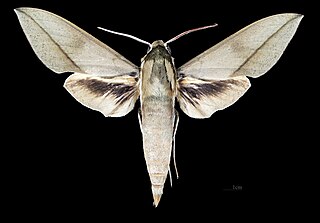
Theretra celata is a moth of the family Sphingidae. It is known from the Moluccas east to Vanuatu and south to Australia. It is often treated as a subspecies of Theretra clotho.
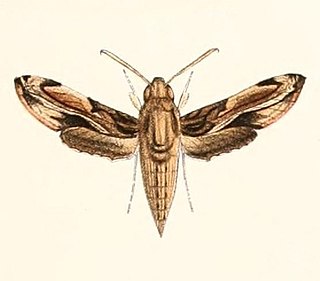
Theretra orpheus is a moth of the family Sphingidae. It is known from most of Africa.
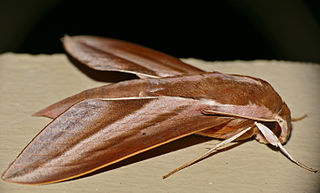
Theretra suffusa is a moth of the family Sphingidae.

Theretra pallicosta, the white-edged hunter hawkmoth, is a moth of the family Sphingidae described by Francis Walker in 1856. It is found from Sri Lanka and India, east through Nepal, Bangladesh and Myanmar to Hong Kong and Taiwan and south through Thailand, Laos and Vietnam to Peninsular Malaysia and Indonesia.
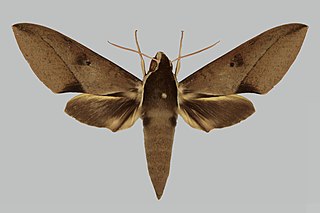
Theretra natashae is a moth of the family Sphingidae. It is found in Indonesia.
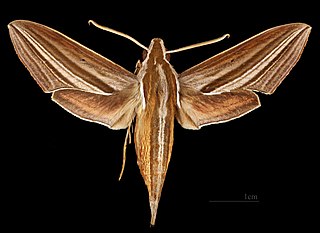
Theretra lycetus, the white-edged hunter hawkmoth, is a moth of the family Sphingidae. It was described by Pieter Cramer in 1775.



















